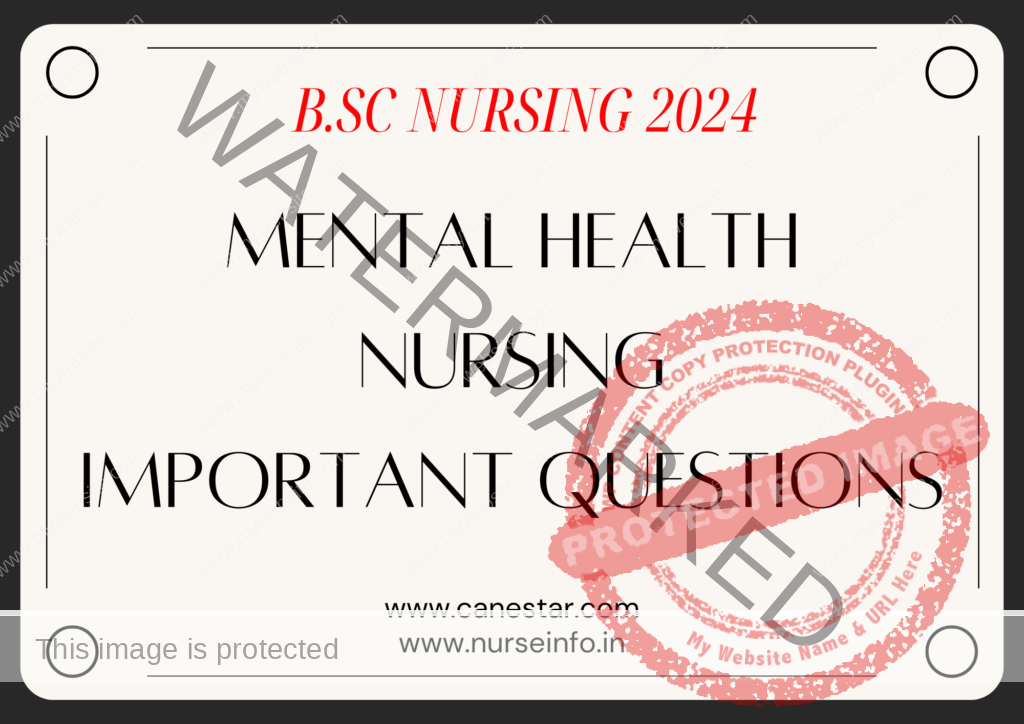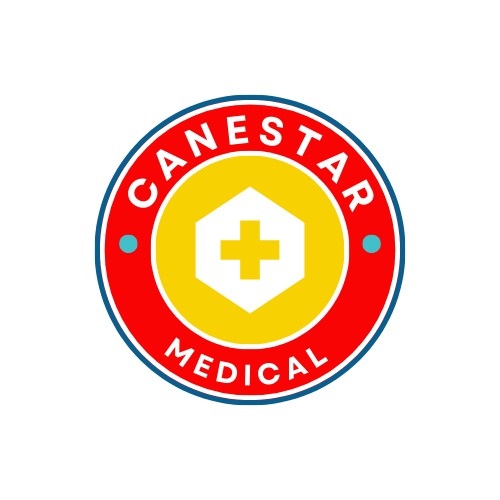MENTAL HEALTH NURSING
IMPORTANT QUESTIONS
FOR BSC NURSING 2024
LONG ESSAY
- General principles and standards of mental health nursing in India
- Discuss process recording and its use
- Explain nurses role in community mental health nursing
- Discuss in brief detoxification, antabuse, narcotic antagonist therapy and harm reduction of patient with substance use disorders
- Describe etiology and psychopathology of patient with personality disorders
- Historical development of community mental health services in India
- Discuss the nature, settings and functions of contemporary psychiatric nursing practice
- Mention types of substance abuse. Explain nursing care of patient with alcohol abuse
- What is Bi-polar mood disorder. Explain care of patient with acute depression
- Discuss the admission and discharge procedures according to the mental health act
- Explain the different types of crisis and discuss in detail the steps of crisis interventions
- What are the clinical features of delirium. Explain the nursing management in acute delirium
- Define crisis and discuss nurses role in crisis intervention
- Describe nurses role in psychiatric rehabilitation
- Explain the admission and discharge procedures according to Indian mental health act
- Define mental health and mental illness. explain in detail the principles of mental health nursing
- Define BPAD and classify the various mood disorders. Discuss management of a depressed patient
- Define ECT. Describe care of a patient before, during and after ECT
- Define therapeutic communication. Explain the phases of therapeutic communication techniques
- What is electroconvulsive therapy. Explain the role of nurse in ECT
- What are the clinical features of catatonic schizophrenia. Explain the nursing management of a patient with catatonic schizophrenia
- Define community mental health nursing. Discuss the role of nurse in preventive psychiatry
- Define bipolar disorder. Explain the role of nurse in the care of a manic patient
- Define substance abuse. Explain the treatment and nursing management of patient with alcohol dependence syndrome
- Explain the etiology of psychophysiological disorders. Describe the management of patient with crohn’s disease
- Describe the clinical features in mania. Prepare a nursing care plan mania for a patient with manic episode
- Define mental retardation. Discuss the nursing management of a child with profound mental retardation
- National mental health program
- Therapeutic nurse-patient relationship
- Depressive disorder
SHORT ESSAYS
- Classification of mental disorders
- Interpersonal environment
- Communication model
- Toxins and poisons
- Psycho-physiological disorder
- List the functions of mental health team
- Psychodrama
- Discharge procedure
- Tics disorder
- Theory of grief
- Theories of grieving process
- Obsessive compulsive disorders
- Forensic psychiatry
- Behavioral problems of adolescents
- Crisis intervention
- Neurological assessment
- Mental retardation
- Mental health team
- National mental health programme
- Purpose of nursing process in the psychiatric nursing
- Childhood schizophrenia
- Neuroleptic malignant syndrome
- Scope of psychiatric mental health nurse
- Describe the major concepts of community mental health
- Discuss the stages of family therapy
- Legal aspects of psychiatric nursing
- Anxiety
- Crisis intervention
- Play therapy
- Sociopathic reaction
- Benzodiazepines
- Narcissistic personality disorder
- Clinical picture in generalized anxiety state
- Management in phobia
- Suicide prevention
- Antidepressants
- Criminal responsibility
- Levels of prevention
- Sexual disorders
- Characteristics of mentally healthy individual
- Classify personality disorders
- Neuro leptic malignant syndrome
- Conduct disorders
- Alcoholic anonymous
- Care of patient with suspicious behavior
- Lithium carbonate
- Milieu therapy
- Day care centres
- Any five general principles of psychiatric nursing
- Alcohol dependence syndrome
- Explain signs and symptoms of post-traumatic stress disorder (PTSD) and briefly explain the nursing management for a patient with PTSD
- Describe etiological factors, and signs and symptom of attention deficit hyperactivity disorder
- Occupational therapy
- Mental health issues among elderly
- Explain therapeutic impasses and interventions for overcoming them
- Explain the current trends in mental health nursing
- Differentiate institutionalization and de-institutionalization
- Types of admission and discharge for mentally ill
- Johari window
- Existential model
- Difference between normal and abnormal behavior
- Explain the role of nurse in occupational therapy
- Antipsyhotics
- Obsessive compulsive disorder
- Therapeutic community
- Discharge procedure
- Group therapy
- Techniques of therapeutic communication
- Concept of normal and abnormal behavior
- Antidepressant
- Civil right of mentally ill
- Alternative system of medicine
- Somatoform disorder
- Management of patient with aggressive behavior
- Phobia
- Nursing management of patient with narcotic withdrawals
- Enuresis
- Extra pyramidal reactions
- Half way homes
- History collection in psychiatry
- Concepts of normalcy and abnormalcy
- Psychosomatic disorders
- Anti-psychotic drugs
- Substance abuse
- Conduct disorder
- Obsessive compulsive disorder
- Epilepsy
- Rehabilitation
SHORT ANSWERS
- Free association
- Half way home
- Delusion
- Neologism
- Word salad
- Auditory hallucination
- Thought broadcasting
- Rapport
- Fetish
- Atypical antipsychotic
- Token economy
- Intelligent quotient
- Delusion
- Auditory hallucination
- Sheltered workshop
- Lithium
- Projection
- Echolalia
- Aversion therapy
- Cognitive development
- Detoxification
- Genuineness
- Integration
- Magical thinking
- Mental imagery
- Phobias
- Reaction formation
- Selective abstraction
- Abreaction
- Delusion of reference
- Alcohol withdrawal symptoms
- Contraindications for electro convulsive therapy
- Voyeurism
- Transference
- Reception order
- Define dementia
- Childhood autism
- Echolalia
- Agoraphobia
- Mood and affect
- Hypochondriasis
- Reaction formation
- Biofeed back
- Neurosis and psychosis
- Narco-analysis
- Oculogyric crisis
- Guided imagery
- Rum fits
- Advantages of token economy
- Indications of light therapy
- Types of crisis
- Meaning of enuresis
- List the sexual disorders
- Antabuse drugs
- Meaning of obsession
- List the types of phobia
- Leave of absence
- Dementia
- Grief
- Forensic psychiatry
- Fugue
- Cataplexy
- Aphasia
- Verbigeration
- Neologism
- Perseveration
- Labile affect
- Cyclothymia
- Ambivalence
- Delusion
- Flight of ideas
- Confabulation
- Transvestism
- Attention deficit hyper active disorder
- Process recording
- Token economy
- Akathesia
- Differentiate between psychosis and neurosis
- Purposes of ego defense mechanism
- Enumerate stages of grieving
- Testamentary capacity
- Cognitive behavior therapy
- Objective of national mental health programme
- Purpose of classification of mental disorders
- Disorders of perception
- Psychosexual disorders
- Patient rights
- Disulfuram drug
- Amnesia
- Insight
- Grandiose delusion
- Play therapy
- Hypnosis
- Definition of mental health nursing

